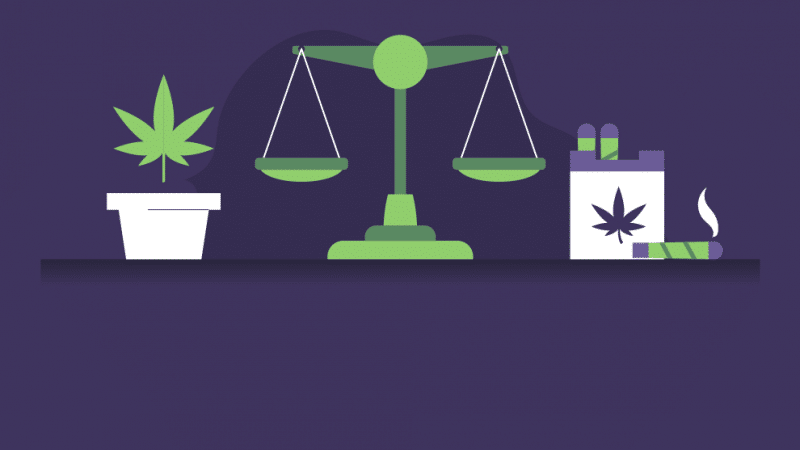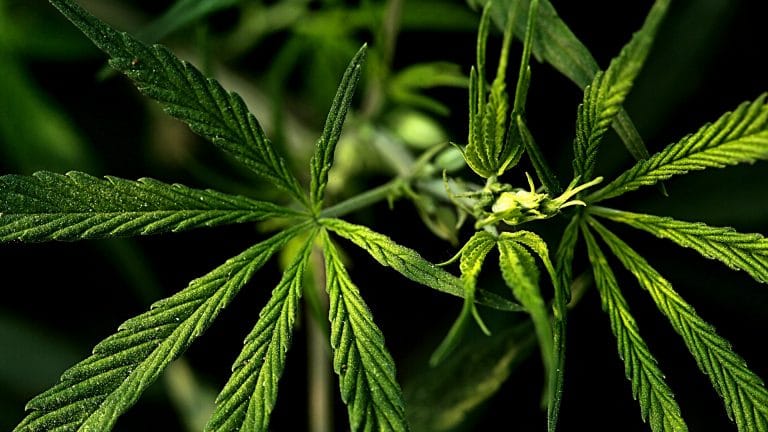Health Pros and Cons of Weed (Infographic)

With all the latest hype about cannabis, its legal status, and its uses, you can’t help but wonder a bit about the pros and cons of weed for your body and mind. Even if you’ve been an avid consumer, are you using it right?
What is your body receiving by taking CBD and THC into your system? If you haven’t tried weed yet, should you? From all the news you’re getting, perhaps cannabis will do wonders for your well-being.
If you’re conflicted, that’s completely understandable. Medical marijuana is allowed under certain conditions only, but the demand for it is very high as it seems to work very well in practice while we’re waiting for more research to be approved.
So, why is marijuana illegal in some states, and illegal in others?
To clarify all these questions, take a look at our cool and easy-to-understand infographic. It seems some states focus on the benefits on marijuana, and others on its downsides. Here’s what all of us should know about weed.
To Legalize Marijuana, or Not to Legalize…
If we look at the course of history to find the pros and cons of recreational marijuana , the first evidence of enjoying weed dates back centuries ago, whereas its prohibition was introduced only in 1937.
It all started with the Mexican Revolution in 1910. While marijuana was being used as a medicine for a long time, it slowly began to gain a notorious reputation by associating it with violence and danger.
Eventually, the negative effects of weed were emphasized more and more until 1937 and the Marihuana Tax Act, the first law to criminalize marijuana. Followed by its ban from the US Pharmacopoeia, weed was completely removed from medical practices.
Recently, however, the public has shown a perked interest in CBD, THC, and terpenes. Step by step, with a bit of media support and word-of-mouth, the States have become more open to the legalization of weed and producing top-quality CBD oil.
Not only for medical purposes but for recreational as well, with Washington and Colorado taking the lead and pronouncing marijuana legal in 2012.
There are many reasons why medical marijuanas should be legal. Medical marijuana has already been proven to be beneficial for numerous health conditions (like epilepsy, cancer, pain, anxiety). On top of that, taxing it can help the economy grow.
So far, 35 states have legalized medical marijuana, though the rules and regulations do vary from state to state. 17 states have legalized recreational marijuana, and we hope for more in 2021. At the moment, 68% of Americans are feeling supportive of cannabis legalization.
Top Health Pros and Cons of Smoking Weed
In order to present you with the arguments for and against, we have decided to show you both the good and bad effects of smoking marijuana.
Hardly anything is perfect in this world, and weed is no exception to this rule. The following will hopefully guide you through the advantages and downsides, so you can decide for yourself whether consuming marijuana would work for you.
10 Key Marijuana Benefits for Our Health
What we are giving you right now is just a glimpse of all the things marijuana could do for you, so you are entitled to a lot more if you start using it. Here is a brief preview of its powers:
1. Weed Helps to Get Off Drugs
Believe it or not, smoking marijuana helps reduce the tensions caused by drug abuse. For instance, it can reverse the consequences caused by heroin use for our brains. Why marijuana should be legal? Legalizing marijuana would help a lot of people fight their demons simply because their brains would function better.
CBD is especially useful since it can undo the effects heroin has on cannabinoid receptors. By the way, the receptors are spread throughout our body, so the CBD effect is felt profoundly. In addition, this compound does wonder in reducing anxiety and cravings.
As a result, high-quality CBD oil is very much in demand.
Cannabis is very useful in treating OUD (opioid use disorder), and there is potential for replacing opioids altogether someday because the plant does not generate so many side effects.
2. Benefits of Weed for Bone Health
If we take a look at recent studies, it appears that smoking marijuana should be prescribed to all patients who are recovering from fractures. Weed can help you strengthen your bones and speed up the healing process.
Trabecular bones will be especially grateful for the weed treatment, and they are vital for our health, seeing as this is where blood cells are made.
3. Multiple Defenses Against Multiple Sclerosis Symptoms
Those struggling with multiple sclerosis could provide quite a lot of insight into the discussion about the pros and cons of weed.
Firstly, stiffness and spasms are very much decreased if one includes cannabis in the treatment, and the muscle tone gets better as well. Marijuana has anti-inflammatory effects, which come in handy, to say the least, in fighting the auto-inflammatory reaction of the immune system.
4. Dealing with Diabetes
If an average cannabis user is to take a HOMA-IR test, the results would be 17% lower than the usual response. Overall, Diabetes 2 is not frequent among marijuana consumers.
When we think about the pros and cons of weed legalization, it seems that legalization of marijuana would enable a greater number of people to have a lower fasting insulin level—weed consumers have 16% lower fasting insulin levels than those who don’t.
5. Marijuana Fights Depression
In one study, 89% of the participants confirmed weed helped them reduce the symptoms. Marijuana has such power over depression, anxiety, and insomnia that its endocannabinoid signaling mimics common antidepressants but without the problematic side effects.
6. Medical Marijuana Benefits for Treating Dementia
This is where THC comes under focus. Some preliminary laboratory studies show that THC can diminish b-amyloid proteins in human neurons. There is also evidence that THC, along with other Cannabis compounds, can encourage amyloid-beta cellular removal.
Given that different marijuana strains contain different CBD and THC proportions, it’s hard to get the same results because every study uses different strains.
So, does weed kill brain cells when you smoke it? The results of a study from 2019 showed that it may change the ratio of white and gray matter in the brain.
7. ADHD Disorder Gets Controlled with Cannabis
Weed can act in two ways when fighting attention deficit hyperactivity disorder. First, it treats nausea and insomnia, common for ADHD. Secondly, more severe (and opposing) symptoms of ADHD are reduced, too, such as depression and hyperactivity.
8. Weed Makes the Pain Go Away
Is weed good for you? One of the medical benefits that marijuana is famous for are its pain-relieving properties. Those suffering from chronic pain often use medical marijuana because it gives them pain relief without the annoying side effects of common painkillers.
In fact, weed works wonders for different types of pain, from digestive and nociceptive to chronic pain. Over 60% of patients use their medical marijuana for this purpose, sometimes even in the form of tasty CBD gummies.
On that note, there are pros and cons of edibles you should be aware of. Speaking of pros, edibles are a healthier option than smoking. Given that there is no inhalation, edibles are a better choice for people who suffer from breathing complications.
The duration of the effect is longer, and they are much more discreet.
There is a higher risk of overdose when it comes to cons, and it’s harder to measure the correct potency.
9. Marijuana Against Migraines
The pros and cons of cannabis often speak about headaches. There’s no headache like a migraine headache, and only those suffering from it know just how unpredictable and controlling it may be.
Headache is more common in women—18% of women suffer from it, as opposed to 9% of men. Anti-inflammatory effects of weed help treat neurogenic inflammation, and they prevent the attacks as well.
10. Cancer Treatment and Cannabis
The pros and cons of medical weed are also often linked to cancer. Cancer patients are perhaps the most responsible for weed’s good reputation. It helps them fight back nausea and vomiting caused by chemotherapy.
Marijuana’s benefits include increased appetite, and maintaining a healthy weight. Also, studies show a reduction of pain, numbness, and weakness.
And now, let’s take a look at the other side of the coin.
10 Known Cons of Marijuana Consumption
Although weed possesses some undeniable health benefits, it does come with a few downsides as well. Here are the most common ones:
1. Potential Addiction
Even though marijuana is not considered addictive per se, around 10% of weed consumers may develop a cannabis use disorder (CUD).
Regular and long-term use can make us too accustomed to some of the marijuana effects, and an abrupt stop may result in withdrawal symptoms.
Pros and cons of smoking weed every day often mention headaches, shakiness, extreme sweating, insomnia, and stomach pain as the main withdrawal symptoms.
2. Cognitive Skills at Risk
Chronic marijuana consumers may suffer from memory impairment. The brain could endure some damage in the form of decreased neural efficiency called SME (Subsequent Memory Effect).
Can marijuana kill the brain cells in this case? It’s hard, to put it bluntly, but many medical pros and cons of weed report that the motoric skills are at risk because weed makes changes to corticostriatal networks responsible for motor learning and control.
3. Weed Is Bad for Your Oral Health
One of the consequences of smoking weed that you may experience is dry mouth, which is a risk factor for developing cavities and gum disease. Furthermore, smoking cannabis is oftentimes associated with mouth and neck cancer.
4. Side Effects of Weed Cause Breathing Problems
Similar to a regular cigarette, a joint can harm your lungs. Smoke is smoke, after all, and marijuana smoke contains ammonia and hydrogen cyanide, among other dangerous chemicals.
Some ingredients in marijuana smoke are even more concentrated than in ordinary tobacco smoke. Large air sacs that diminish your lung capacity can appear in the lungs due to smoking weed, too.
5. Marijuana Is Not Good for Your Heart
How effective is weed on the heart? On the one hand, weed is good for relaxation. On the other hand, recreational weed can cause tachycardia, dilated blood vessels, and overall make our beloved pump work harder than it is supposed to.
To sum up, weed is not recommended for patients with a history of heart disease.
6. Do Not Smoke Weed During Pregnancy
There are several reasons for this. Although weed tends to reduce nausea, pregnant women are not advised to use it. Research on the pros and cons of smoking weed while pregnant shows that marijuana is not beneficial for pregnant women.
Some of the most harmful effects of smoking weed while pregnant include the newborn baby’s low birth weight, cognitive damage, emotional disorders, and reduced ability to play or pay attention.
7. THC in Cannabis Causes Paranoia
The “bad boy” THC owes its notorious reputation precisely to this feature. In a new study, THC seems to be the main culprit for sensory perception and paranoid thoughts, thus adding to the list of pros and cons of weed.
Half of the participants using cannabis complained about paranoia, while only 30% of the placebo group had similar objections.
8. Weed Consumers Risk Schizophrenia
One of the biggest arguments in the pros and cons of weed discussions is that prolonged and heavy use of marijuana can lead to schizophrenia. This is also blamed on THC, as it is known to encourage emotional withdrawal, blunted affect, and motoric skills impairment.
9. Cannabis Lovers Have Low Testosterone
Whoever is trying to conceive should rethink their cannabis consuming habits. It can have an impact on sperm concentration.
For example, regular marijuana use was connected to a decrease in sperm concentration of 28%. If it was combined with other recreational drugs, the percentage was as high as 52%.
Other studies that involve the pros and cons of recreational weed show that cannabis can cause erectile dysfunction.
In other words, some THC compounds can cause problems like erectile dysfunction, given that the cannabinoid receptors can be found in the soft tissues of the penis.
What’s more, cannabis can also decrease sexual desire due to its effects like euphoria and drowsiness. Keep in mind that we still need more evidence to confirm these claims.
10. Weed Side Effects and Testicular Cancer
The statistics show cannabis can help develop an aggressive form of testicular cancer that occurs in younger men.
Regular weed smokers are two times more likely to become ill with the disease. Heavy marijuana use can disrupt the hormonal balance, which can contribute to forming cancerous cells.
Now, let’s talk about marijuana money matters. What are the main pros and cons?
Economic Pros and Cons of Legalizing Weed
How can legalization help the economy?
1. Pro: The states can collect bigger tax revenues.
Marijuana sales lead to taxes and fees that can help the economy flourish.
For example, in Connecticut, dealers have to pay $3.50 (per gram) for all cannabis goods. In Michigan, retailers have to dispatch a 6% tax to their customers. In Nevada, cultivators pay a 15% excise tax.
Another example is Colorado. When we study the pros and cons of Colorado legalizing weed, we’ll notice that the state managed to bring in $387,480,110 in fees and taxes in 2020 alone.
Moreover, Colorado takes 2.9% of sales taxes for recreational and medical marijuana and 15% of retail marijuana excise tax.
Since 2014, when Colorado started to collect taxes, they collected almost $1.6 billion in cannabis taxes and $9.8 billion in cannabis sales.
2. Con: Working under the influence of marijuana might lead to occupational injuries.
Why shouldn’t marijuana’s usage be legalized? Unlike alcohol, marijuana testing doesn’t imply how much THC would be enough to make a person incapable of work.
Some studies show that people under the influence of marijuana are more likely to have a work-related accident that could lead to injuries.
3. Pro: Cannabis taxes could lead to more jobs and investment opportunities.
Let’s look at the pros and cons of the legalization of weed. We’ll notice that legalization could lead to numerous investment opportunities. For example, if marijuana became legal, many companies would be able to list their stocks.
When it comes to jobs, legalization would contribute to more job openings in the cannabis industry, from nurseries and dispensaries to consultants, cultivation assistants, and budtenders.
4. Con: It could lead to the rise or fall of the property prices.
By analyzing the pros and cons of weed being legalized, we noticed that legalization could lead to property value changes. How so?
Based on one study conducted in Colorado and Washington, legalization was responsible for the growth in home values by $22,888 between 2014 and 2019. On top of that, the price of homes closer to the dispensaries went up by 8.4%. Admittedly, this could list as a pro by real estate agencies.
Bottom Line
Is weed bad for you or not? The answer is it could be both. Marijuana possesses a lot of qualities that work together. Although it has become almost as common as drinking alcohol or sipping green tea, it’s wise to use weed in moderation too.
Good deals on cannabis make consumption all the more appealing.
You should consult with your doctor before you pay a visit to the local dispensary and be open about any health issues you may have. Also, deciding on the different ways to consume marijuana is important.
In the end, the cons and pros of smoking weed turn out to be quite personal. You decide if and how you will use it, and your body and mind will react to it uniquely.
Marijuana is not a gateway drug, though it is mildly addictive, nor is it a dangerous drug. It is not an instant kit for turning you into a criminal either.
Weed is powerful medicine and has been that way for thousands of years. Just be careful to use it in moderation the same way you would use other stimulants.
FAQs
What are the cons of edibles?
First of all, it’s hard to measure the potency. Yes, some labels show edibles’ potency, but they are not 100% precise. If you make edibles yourself, you definitely can’t vouch for the mg of CBD or THC in each brownie.
Secondly, their effects last much longer, compared to, for example, smoking marijuana that affects you for about three hours. The length of the effect will depend on the amount you’ve taken, but it can last for hours. Naturally, this is bad if you have to be up and running very fast. This characteristic of edibles is often listed in the pros and cons of weed. Great for chronic pain, but can be tricky and even lead to overdosing.
You can easily get overdosed since it takes time to feel its effect. It might take you 30 minutes, but it also might take you 2 hours to feel its impact.
Why should we legalize marijuana’s usage?
Legalization could have a good impact on the economy. The states can collect taxes on marijuana sales alone.
Legalizing marijuana could lead to more job opportunities. Many jobs in the cannabis industry are well paid. For example, an average annual salary of an assistant grower is $45,000–$70,000.
Last but not least, it could make it more affordable and accessible for medical usage.
Why should not marijuana’s usage be legalized?
Marijuana can have a detrimental effect on one’s mind and body. Cognitive impairment, low testosterone level, tachycardia, paranoia are just some of the possible consequences of prolonged marijuana use.
Also, working under the influence may result in work injuries. Environmental effects add to the pros and cons of weed as marijuana can have both a positive and a negative impact on our planet.






